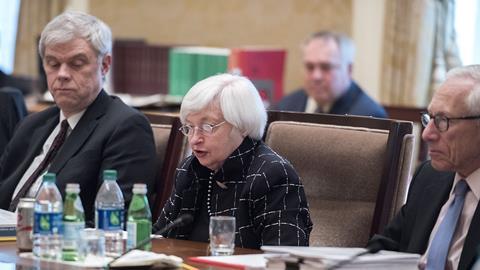The new US Treasury Secretary has warned of the need to tackle rising financial crime, cryptocurrency misuse and cyber attacks.
Janet Yellen, speaking at the US Treasury Department’s inaugural Financial Sector Innovation Policy Roundtable this week, said impending changes to anti money laundering laws in the US “couldn’t have come at a better time.”
She said: “As this group knows very well, we’re living amidst an explosion of risk related to fraud, money laundering, terrorist financing, and data privacy. As the pandemic has moved more of life online, crime has moved with it.
“We’re seeing more – and more sophisticated – cyberattacks aimed at institutions that hold up our society: hospitals, schools, banks, and even our government.”
Yellen, also said the misuse of cryptocurrencies “is a growing problem” and urged private companies to work with the government to combat criminals exploiting the technology.
She said: “Cryptocurrencies have been used to launder the profits of online drug traffickers; they’ve been a tool to finance terrorism.
“From my time at the Fed, I know the crucial role your institutions play in combating crimes like these. The private sector invests enormous resources, finding ways to stop bad actors from misusing existing technologies. You also develop new ones.”
The AML Control Act 2020 expands definitions of currency exchange and monetary instruments to bring virtual assets under increased regulation (see box below).
Last month, Yellen also pledged to start work on building a new register of beneficial owners as quickly as possible as cleaning up the US’ corporate transparency problem is a “very high priority.”
The US legislation explained
The National Defense Authorization Act for Fiscal Year 2021, was passed on New Year’s Day after congress overrode President Trump’s veto.
The over-arching bill includes a new Corporate Transparency Act and the Anti Money Laundering Control Act of 2020.
The measures at-a-glance:
-An established, secure, non-public database shall be established at FinCEN for companies’ beneficial ownership information. Companies that do not do business in the US but are registered there will be required to report their true beneficial owners
-The Treasury Secretary will be required to make public national priorities on AML/CFT and FinCen will be required to adopt regulations to ensure compliance.
-Definitions of “currency exchange and monetary instruments” are expanded to include substitutions for fiat currency, clarifying the ability to regulate virtual assets.
-The Act provides for the establishment of a “FinCEN exchange” to aid better information sharing among law enforcement and national security agencies.
-The Attorney General would prepare an annual report on the usefulness of information reported by financial institutions. FinCEN would also be required to seek feedback from law enforcement agencies on the usefulness of SARs and produce a report on this for financial institutions. FinCEN is also required to semi-annually report on threat patterns and trends.
-The Treasury would permit streamlined reporting and automated reporting for less complex SARs.
-The Bank Secrecy Act Advisory Group of regulators, bank representatives and public officials, will be required to form a subcommittee on technology and innovation in AML and CTF. FinCEN and other regulators will be required to appoint BSA “Innovation Officers”
-The US Treasury is given a year to carry out a study on money laundering and the financing of terrorism through trade in works of art and antiquities and report the findings
-FinCEN will be authorised to establish a pilot programme to allow US financial institutions to share information regarding SARs with foreign branches, subsidiaries and affiliates. This would not be permitted in certain jurisdictions. This followed criticism of current disclosure rules following the FinCEN Files leak last year.
-Increased ability of the Treasury Department and the Department of Justice to subpoena records from non-US banks that maintain correspondent accounts with banks in the US.
-Repeat offenders breaching the Bank Secrecy Act, could face increased penalties. The act provides for the imposition of additional penalties that would be based on three times the profit gained or loss avoided by the repeat offender or double the penalty amounts that would otherwise apply
-Whistleblowers who provide information that results in a successful enforcement of the BSA be awarded up to 30 percent of the amount that is collected in monetary sanctions.









No comments yet